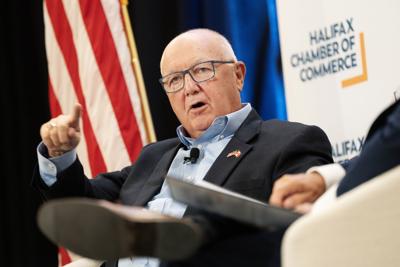When people talk about being ŌĆ£diplomaticŌĆØ they usually mean something along the lines of being tactful, sensitive, of smoothing over difficult issues.
In that sense Donald TrumpŌĆÖs top diplomat in this country, U.S. Ambassador , must be the least diplomatic guy around.
If heŌĆÖd set out deliberately to inflame Canadian opinion, Hoekstra couldnŌĆÖt be doing a better job of it. HeŌĆÖs been going on about how ŌĆ£disappointedŌĆØ he is that Canadians have their backs up in the face of TrumpŌĆÖs tariffs and hostile rhetoric and lamenting the ŌĆ£anti-AmericanŌĆØ tone of the federal election campaign. When it comes to blatant insults like all that ŌĆ£51st stateŌĆØ talk, his advice has been blunt: ŌĆ£Get over it.ŌĆØ
But being an effective diplomat doesnŌĆÖt actually mean making nice all the time. HoekstraŌĆÖs actual job is to represent the president of the United States and by that definition he gets top marks. I think itŌĆÖs time we stopped abusing the ambassador and started appreciating the value of having him among us, touring the country and making us come to terms with the true face of Trumpism.
A lot of Canadians are enjoying getting upset about HoekstraŌĆÖs most recent comments at an event in Halifax. ŌĆ£GaslightingŌĆØ is the description of choice ŌĆö blaming us for striking back with travel boycotts and the like after Trump launched his trade war. (ThatŌĆÖs a word, by the way, the ambassador very much objects to. ŌĆ£A dangerous place to go,ŌĆØ he says.)
But would it be better to have an oily ŌĆ£diplomatŌĆØ fronting for Trump in this country? Would it be preferable to have someone who was all smiles and niceness while his boss conspired against us in the background?
Better to get the unvarnished truth up front and learn to deal with it. Hoekstra has played a significant role in getting the Trump administrationŌĆÖs message through to Canadians. In August he started talking about CanadaŌĆÖs retaliatory tariffs on goods covered by the CUSMA trade deal and warned they put that whole agreement at risk as it comes up for a formal review.
Barely a week later the Carney government dropped those tariffs. It was billed as a way of keeping trade talks going but there was obviously more to it than that. The government had taken on board the argument that tariffing CUSMA-covered goods undermined its longer-term goal ŌĆö making sure the U.S. wants to review or even renegotiate the deal rather than just walking away from it entirely.
No doubt the government was hearing the same arguments directly in Washington during all those LeBlanc-Lutnick sessions that chewed up much of the summer. But Hoekstra surfaced the issues for a broader Canadian public.
That earned him a fair amount of abuse (including from me at one point) because it ran smack against the ŌĆ£elbows upŌĆØ sentiment shared by so many Canadians. But the Carney team obviously saw the point, especially since retaliatory tariffs werenŌĆÖt working anyway.
On a more general level Hoekstra is voicing the sense of grievance that Trump clearly feels towards the whole world. Canadians, like many other people, tend to see the U.S. as a colossus that has grown rich under a global system it did more than any other country to construct.
But Trump sees it the other way around. At the United Nations this week he whined about how other countries have taken advantage of the United States ŌĆö until, of course, he came along and fixed it.
HoekstraŌĆÖs gaslighting of Canadians comes from the same place of hurt. Far from being punished by TrumpŌĆÖs policies, he said last week, Canada is doing better than any other country because CUSMA ensures we still have the lowest tariffs with the U.S. (an argument also pushed by Mark Carney). ŌĆ£Your relative position has improved,ŌĆØ says Hoekstra, yet Canadians have turned against the United States. How ungrateful!
To be absolutely clear, I find HoekstraŌĆÖs arguments as irritating as anyone else. But I think itŌĆÖs worth listening carefully to what he says because he isnŌĆÖt just provoking Canadians for no good reason. HeŌĆÖs voicing a world view that this country must deal with ŌĆö for at least the next three and a half years, and likely for much longer than that.
The better we understand, the better we can prepare to meet the challenges of that future. For that, if nothing else: thanks, Mr. Ambassador.
Error! Sorry, there was an error processing your request.
There was a problem with the recaptcha. Please try again.
You may unsubscribe at any time. By signing up, you agree to our and . This site is protected by reCAPTCHA and the Google and apply.
Want more of the latest from us? Sign up for more at our newsletter page.



























To join the conversation set a first and last name in your user profile.
Sign in or register for free to join the Conversation